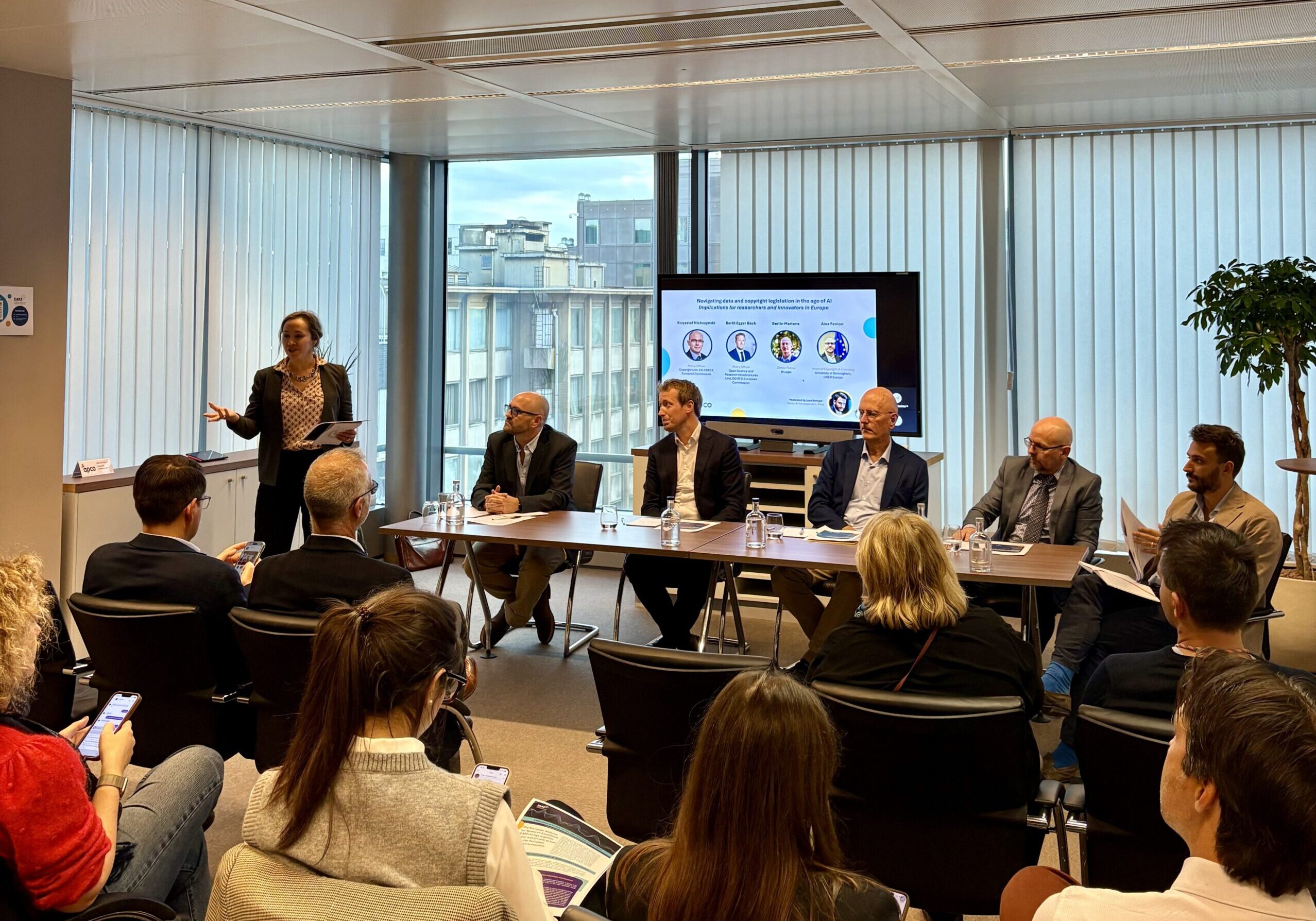Reflections from the Navigating Data and Copyright Panel
In this blog, Alex Fenlon reflects on the European Alliance for Research Excellence (EARE) organised event “Navigating data and copyright legislation in the age of AI: the implications for researchers and innovators in Europe,” which was held on Wednesday 1st October in Brussels.
It’s vital for research libraries to engage in the discussions on EU copyright and data legislation, to help shape policies that drive research and innovation in Europe. Participating the event on behalf of LIBER, I took part in the discussions in my roles as a Co-Chair of the Copyright and Legal Matters Working Group, and as a member of the AI Task Force. I sat on a panel alongside European Commission (EC) policy officers Bertil Egger Beck (Open Science and Research Infrastructure DG RTD) and Krzysztof Nichczynski (Copyright DG-CNECT), an economic consultant Bertin Martens (Bruegel), with the session chaired by a prominent tech journalist Luca Bertuzzi (MLex).
The event focused on how researchers access and use data for research, the legal issues, how AI impacts research, and to discuss policy recommendations. There were opening comments followed by some questions from the chair and audience that included stakeholders from the broader research community, EU institutions, and the technology sector together with other industry representatives.

The discussion opened with EC colleagues detailing EU copyright law and how it is relevant to research. The focus here was on Articles 3 and 4 of the Copyright in the Digital Single Market Directive and the AI Act. DG-CNECT affirmed that AI training is within the scope of these articles for non-commercial scientific research and commercial use unless rights holders opt out. The DG CNECT panellist confirmed the AI Act is intended to create a licensing market to improve data access, though it will require time to assess and refine.
Open Science continues to be a central policy objective for the Commission, with increased activity supporting European Open Science Cloud (EOSC) and reforming research assessment. DG-RTD referenced the EC’s extensive 2024 report “Improving access to and reuse of research results, publications and data for scientific purposes“ which proposed a number of policy solutions to address challenges researchers face, while outlining the Commission’s move towards depth impact assessments.
In the economic consultant’s view, copyright law, while designed to protect investment, is now hindering innovation. They argued that Articles 3 & 4 are no longer fit for purposes with most research being funded by private industry, outside of the scope of Article 3, and Article 4 limiting the volume of data available to train AI inevitably impacting model quality, accuracy, and robustness.
My contribution focused on the lived experiences of researchers and libraries. The EC report identified that 80% of researchers report problems accessing and using data/ content in research. The vast complex web of EU law causes anxiety and actively chills researcher activity. Earlier this year, the Copyright and Legal Matters Working Group launched an Action Plan based on the report and we continue to promote its activities to the community. I repeated the call for simplified, harmonised legislation that enables open, collaborative, internationally impactful research, and posed the question – do we want researchers to do research or to be lawyers?
Closing remarks from the session mentioned the upcoming 2026 DSM review which will assess whether the legislation is working as intended, and the newly proposed voluntary “opt-out registry” which would allow rights holders to exclude content from Article 4. Concerns were raised that the EU’s legal framework could reduce competitiveness, as innovation-friendly countries attract more investment and tech companies may avoid building separate models for the EU, limiting European access to advanced AI products.
Secondary Publishing Rights (SPR) were discussed as a way to help researchers republish their work independently. The Commission is exploring an EU-wide SPR based on laws in six member states.
A question from the audience focused on the European Research Area Act (ERA) which aims to create a borderless research market. It’s under consultation, with a new law expected in late 2026. Attendees stressed that ERA must address deeper legal issues to be effective.
Now is the time for action. The panel discussion made it clear that policy makers and attendees are engaged and interested in supporting researchers and enabling Open Science and world class research to flourish. Research libraries must engage fully with consultations and policy officers to ensure the issues, wants, and needs of our communities are included in any impact assessment and policy decisions. Within LIBER, the Copyright & Legal Matters Working Group continues to actively monitor, inform, and speak on the European legislative developments, relevant to research libraries and open science community. The contributions can be seen in initiatives such as the earlier referenced Action Plan on Improving Access and Reuse of Research Results. By continuing to collaborate with organisations like EARE, Communia, Science Europe, LERU, EUA, and projects like EOSC, KR21, and IP4OS, – among many others – we can make our voices heard.
More information
More information about the panel is available on the EARE Forum report, including event background information and highlights.
Photo credit: EARE
Related News